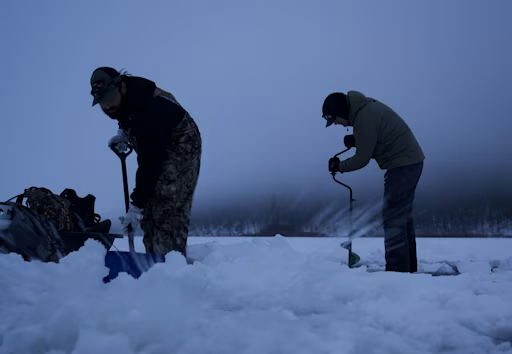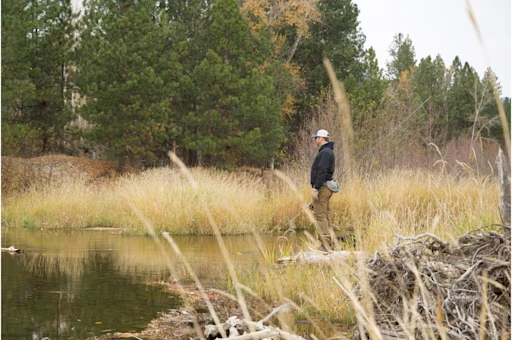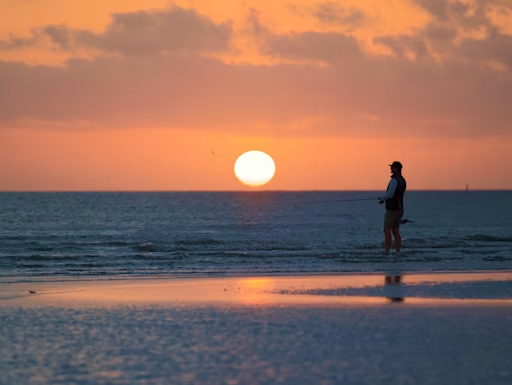Troubleshooting common fishing problems
New to fishing and wondering if tangling your line is normal, and what (if anything) can you do about it? Learn about common fishing problems and their solutions.
Share this article

The Unwritten Hurdles of Learning to Fish
At this point we’ve covered all the fishing gear you’re going to need to start out, and did a brief introduction to fishing lures, so you should be ready to go get on the water. Before you make the trip to your local watering hole make sure you’ve got the basics down. Tie something without a hook to the end of your line and take a couple practice casts at home. Make sure you know how to use the rod, and that it works properly. Prepare your tackle box and get everything set the night before. Once you finally make the trip you’re not going to want to be dealing with these things.
The Famous Rock and Log Fish
So you’ve taken a couple casts and that bite you thought was a sure thing turns out to be your lure stuck under a rock or on a stump, or maybe it's not even in the water and you're 20 foot up a tree. Seems like the pros never get stuck. It’s going to happen… a lot. Knowing this, and more importantly, ways to get unstuck can help ease your frustration levels and also prevent lost gear.
First off, your fishing line will dictate a lot of things. Light monofilament will snap pretty easily. Braided line will almost ever snap, allowing you to horse more lures out, but use caution. You may bend your hooks, they will need to be replaced, and braided line can really hurt your hands with pressure. If using braid, wrap it around a stick or a tackle box and use that as a tool to pull. With underwater hangups it usually helps to change your angle. Walk 10 yards to the left or right and then give a pull. If you’re really stuck don’t stress your rod on it. Let some line out, put your rod behind you and grab the line yourself to exert the force. The current in streams and rivers can drag you into hangups. Simply walk upstream and start pulling from the direction it entered the snag. It should pop right out from the way it went in. If you’re over a branch very slowly reel the lure up to whatever it's hanging from, then give a little pop. It will jump over the branch. Don’t freak out and rip it out…. That will cause it to wrap around 15 other little branches. Brute force is usually the last ditch effort in all of these situations. If you feel you’re going to lose the lure, then pull the line hard so its snaps AT the lure. Don’t cut it where you are and leave 30 yards of loose line in the water or a tree. YOU ARE GOING TO GET STUCK AND LOSE LURES. It's okay, it’s part of it.
The Bird’s Nest
Whether you’ve experienced one or not, a good bird nest can completely ruin a good mood. They are the reason I bring a second rod, the reason I have extra spools of line with me, and the reason I’ve told myself several times that fishing is stupid and I quit. (A birds nest in fisherman’s lingo is extremely tangled line resembling a birds nest) They happen for a variety of reasons ranging from poor spooling, improper casting, twisted line, improper weight of lure to line ratio etc. Regardless of why they happen, in my experience they typically happen slowly and progress over a period of 2 or 3 casts, thus giving you an opportunity to prevent them. Before every cast, do a quick visual check of your spool and the tip of your rod. If the line is uniformly spooled with nothing sticking out and your rod tip isn't wrapped with line you should be good. It's these very minor impurities that, after a cast or two, will turn into a nightmare, rendering your rod useless.
If you find yourself with a birds nest or any type of catastrophic line failure, take your time and slowly work free the loose parts. It's very hard for the singular line with a lure on the end to actually tie any kind of knot. Usually it just needs a bit of attention and untangling. Use your best judgement as to whether this problem can be solved with troubleshooting, or you just need to cut it all off, re tie and restart.
The First Fish
Ok….this isn’t a log….. It's pulling back.... Holy cow this might be the one! Your first hook up is going to be a monumental occasion. You’re going to panic and learn more in these 5-10 seconds than you have thus far in your short career. Don’t beat yourself up if it gets off, it happens. Once you set the hook, keep your line tight, keeping pressure on the fish and gradually get it back to you. No need to spazz out and reel in like you’ve got a winning lotto ticket. If you have a net, use it, If not you’re going to have to use your hands and quickly get it unhooked without doing undo harm. This part, for new fishermen, is going to be daunting. You need to A) get the fish out of the water and into your hand B) not hurt yourself or the fish in gripping it properly C) use some kind of tool or method to unhook it D) get a picture since it’s your first fish EVER!!! E) Release it safely. That’s a lot to do in a short amount of time. Fish prefer to breathe water. And by prefer I mean MUST. So the clock is ticking. Most fish will have dorsal fins (the fins on their “back” that are sharp or spiny). If the fish is smaller and you need to hold it by gripping its back, simply stroke back the fins like a head of hair to prevent getting poked. If the fish is of the larger variety I recommend pinching its lip with your thumb and forefinger. Whatever method you use, at least pretend to be confident and in control. A strong grip in my experience will stop the fish from flopping and panicking. Use a hemostat, line cutter, or needle nose pliers to work the hook or hooks out of the fish and get it back into the water. (TIP: Have your unhooking device in your pocket) Treble hooks can be more difficult, just do your best and work out one hook at a time. A gut hooked fish stands a small chance of survival if you rip a hook out and cause bleeding. A hook CAN be left in in worst case scenarios with the line cut off. It may rust out. This is not recommended, but if its between that and certain death sometimes its worth a shot.
Your Tackle Box
However you organize your tackle is up to you. Just ensure it’s organized. Time on the water should be spent fishing. Keep the boxes as dry as possible. Whenever I find those little silica packets in things I order, I toss them in my boxes as a drying agent. Hooks can be organized onto a safety pin or a cork. Punch holes into the ziplocks that soft plastics come in and throw a D ring or a Key Ring through them to keep them all together. I keep my tackle boxes organized by style. I have a top water box, a crank bait box, a swimbait box, a smaller trout/spinner box etc. Gear checks and organization prior to hitting the water can save you an immense amount of time and frustration when you should be casting and retrieving. We’re all busy. Minimize your troubleshooting by using these tips and utilizing your time off the water for gear checks.
Post written by David Schaeffer
For personal help and tailored advice find me on my subreddit, Instagram, and the Fishbrain App.
David manages the subreddit Fishing for Beginners
Find him on Instagram
Fishbrain user ID: ShiftyUsmc

Download the Fishbrain app and access the best fishing spots in your area
Related blog posts
Discover the best spots, techniques, and gear for successful fishing in urban areas and city waters on Fishbrain.

Master the hardwater season with advanced ice fishing tips . Learn how to find fish faster, refine your search and adjust presentations to catch more fish all winter long.

Your guide to Victoria’s best fish to catch in rivers, lakes, and coastal waters. Learn prime species, fishing tips, and key regulations




